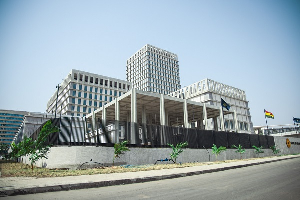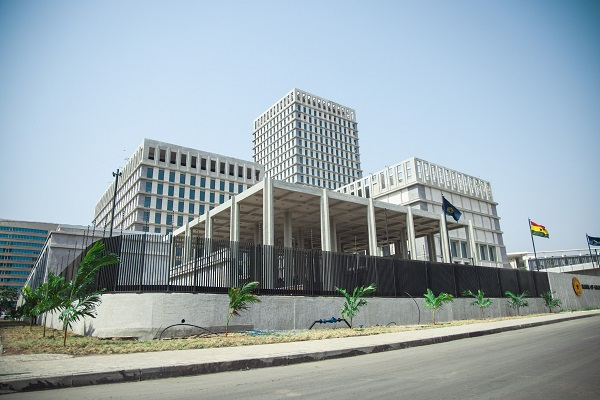 Bank of Ghana headquarters
Bank of Ghana headquarters
According to the country’s central bank, Ghana’s inflation rate has fallen faster than projected; as a result, real borrowing cost has remained elevated, inadvertently harming the economy.
The central bank is now considering an interest rate cut, following its previous record-level alteration.
In September, the bank’s Monetary Policy Committee (MPC) cut its main interest rate by a record 350 basis points to 21.5%.
At the time, Ghana’s inflation had dipped from 11.5% in August to a single-digit rate of 9.4% in September.
The rate drop was 3 months ahead of schedule as the country had projected that it would have a single-digit inflation rate by the end of the year.
This swift recovery appears to have also stunned the financial sector, as Johnson Asiama, governor of the Central Bank, recently disclosed during his introductory remarks at the rate-setting Monetary Policy Committee (MPC) meeting that aligning the reduction in the interest rate with the inflation rate presents a significant challenge.
In the past two sessions, the Bank of Ghana has lowered its policy rate as inflation has decreased from crisis levels.
The next rate decision is anticipated on Wednesday, as seen on Reuters.
According to the central bank governor, consumer inflation was expected to settle between 4 and 6% by year’s end before stabilizing around the goal band of 8% with a margin of error of two percentage points on either side in 2026.
This indicated that Ghana was about to enter what could turn out to be a multi-year phase of price stability.
“As inflation declines faster than projected, real interest rates have risen sharply. Staff analysis shows scope for gradual easing, but the balance must preserve credibility and avoid undermining the disinflation gains,” he said.
Ghana’s debt recovery
Earlier this month, Ghana disclosed that it was looking to come out of its debt program with the International Monetary Fund on its own terms.
Cassiel Ato Forson, Ghana’s finance minister, claims that the nation has so far complied with the IMF’s fiscal responsibility framework standards.
According to the finance minister’s forecasts, the West African nation may have a primary budget surplus of 1.5% of its GDP by 2026.
Ghanaian officials have pledged to uphold a high level of fiscal management in the wake of this estimate, particularly as the country approaches the conclusion of its three-year IMF bailout agreement.
According to the forecast numbers, Ghana’s overall budget deficit is expected to decrease from an estimated 2.8% of GDP this year to 2.2% of GDP in 2026.
Additionally, spending is expected to increase by 20% to 302.5 billion cedis, while revenue and grants are expected to increase by 18% to 268.1 billion cedis ($24.4 billion).
